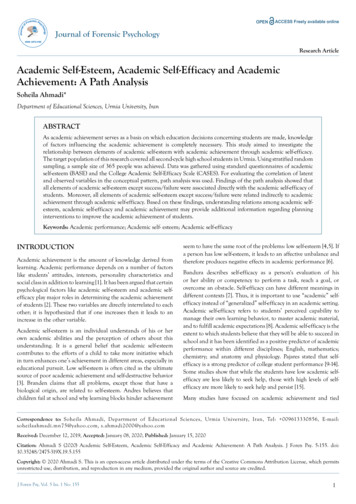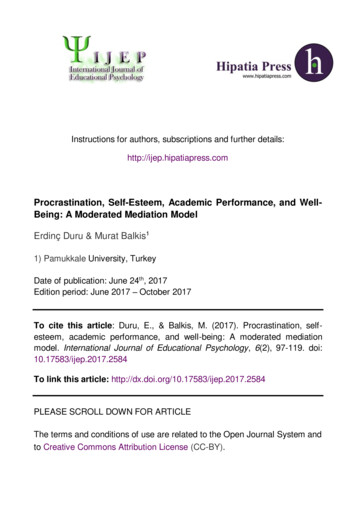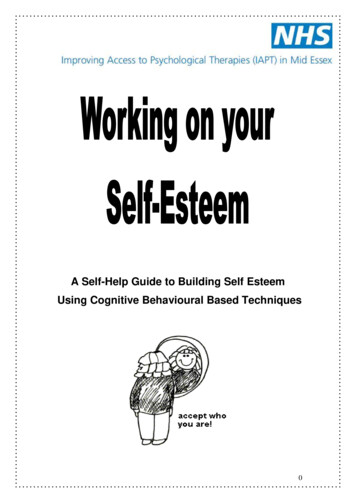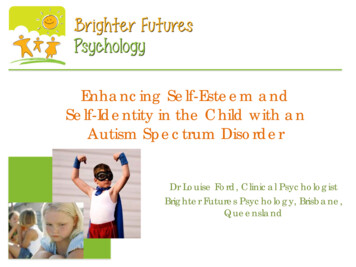
Transcription
ologychJournaloOPENorensic PsyfFACCESS Freely available onlineJournal of Forensic PsychologyISSN: 2475-319XResearch ArticleAcademic Self-Esteem, Academic Self-Efficacy and AcademicAchievement: A Path AnalysisSoheila Ahmadi*Department of Educational Sciences, Urmia University, IranABSTRACTAs academic achievement serves as a basis on which education decisions concerning students are made, knowledgeof factors influencing the academic achievement is completely necessary. This study aimed to investigate therelationship between elements of academic self-esteem with academic achievement through academic self-efficacy.The target population of this research covered all second-cycle high school students in Urmia. Using stratified randomsampling, a sample size of 365 people was achieved. Data was gathered using standard questionnaires of academicself-esteem (BASE) and the College Academic Self-Efficacy Scale (CASES). For evaluating the correlation of latentand observed variables in the conceptual pattern, path analysis was used. Findings of the path analysis showed thatall elements of academic self-esteem except success/failure were associated directly with the academic self-efficacy ofstudents. Moreover, all elements of academic self-esteem except success/failure were related indirectly to academicachievement through academic self-efficacy. Based on these findings, understanding relations among academic selfesteem, academic self-efficacy and academic achievement may provide additional information regarding planninginterventions to improve the academic achievement of students.Keywords: Academic performance; Academic self- esteem; Academic self-efficacyINTRODUCTIONAcademic achievement is the amount of knowledge derived fromlearning. Academic performance depends on a number of factorslike students’ attitudes, interests, personality characteristics andsocial class in addition to learning [1]. It has been argued that certainpsychological factors like academic self-esteem and academic selfefficacy play major roles in determining the academic achievementof students [2]. These two variables are directly interrelated to eachother; it is hypothesized that if one increases then it leads to anincrease in the other variable.Academic self-esteem is an individual understands of his or herown academic abilities and the perception of others about thisunderstanding. It is a general belief that academic self-esteemcontributes to the efforts of a child to take more initiative whichin turn enhances one’s achievement in different areas, especially ineducational pursuit. Low self-esteem is often cited as the ultimatesource of poor academic achievement and self-destructive behavior[3]. Branden claims that all problems, except those that have abiological origin, are related to self-esteem. Andres believes thatchildren fail at school and why learning blocks hinder achievementseem to have the same root of the problems: low self-esteem [4,5]. Ifa person has low self-esteem, it leads to an affective unbalance andtherefore produces negative effects in academic performance [6].Bandura describes self-efficacy as a person's evaluation of hisor her ability or competency to perform a task, reach a goal, orovercome an obstacle. Self-efficacy can have different meanings indifferent contexts [7]. Thus, it is important to use “academic” selfefficacy instead of “generalized” self-efficacy in an academic setting.Academic self-efficacy refers to students’ perceived capability tomanage their own learning behavior, to master academic material,and to fulfill academic expectations [8]. Academic self-efficacy is theextent to which students believe that they will be able to succeed inschool and it has been identified as a positive predictor of academicperformance within different disciplines; English, mathematics;chemistry; and anatomy and physiology. Pajares stated that selfefficacy is a strong predictor of college student performance [9-14].Some studies show that while the students have low academic selfefficacy are less likely to seek help, those with high levels of selfefficacy are more likely to seek help and persist [15].Many studies have focused on academic achievement and tiedCorrespondence to: Soheila Ahmadi, Department of Educational Sciences, Urmia University, Iran, Tel: 009613330856, E-mail:soheilaahmadi.mn75@yahoo.com, s.ahmadi2000@yahoo.comReceived: December 12, 2019, Accepted: January 08, 2020, Published: January 15, 2020Citation: Ahmadi S (2020) Academic Self-Esteem, Academic Self-Efficacy and Academic Achievement: A Path Analysis. J Foren Psy. 5:155. doi:10.35248/2475-319X.19.5.155Copyright: 2020 Ahmadi S. This is an open-access article distributed under the terms of the Creative Commons Attribution License, which permitsunrestricted use, distribution, and reproduction in any medium, provided the original author and source are credited.J Foren Psy, Vol. 5 Iss. 1 No: 1551
Ahmadi SOPENto determine its antecedents. Colquhoun and Bourne soughtto examine how school factors such as school environment,teachers, peers, co-curricular activities as well as demographicfactors such as age, gender, and family background influenceacademic performance and self-esteem. The results showed thatthere is a positive correlation between self-esteem and academicperformance [16]. Aregu examined the effects of self-efficacy, selfesteem and gender on performances in speaking tasks among firstyear university students. The results revealed that speaking selfesteem and speaking efficacy have great effects on performance inspeaking tasks [17]. In another study, the researchers investigatedthe relation between explicit academic self-concepts, implicit selfesteem, and achievement for minority and majority elementaryschool students. They reported that children’s actual achievementwas related to their self-esteem in younger students. Khan et al.studied the relationship between self-esteem of secondary schoolstudents with their academic achievement [18,19]. They foundout that there was significant correlation between the self-esteemand academic achievements of only male students. Yang et al.investigated relations among academic achievement, self-esteem,and subjective well-being among 807 elementary school studentsin China at 3 time points across 18 months [20]. The resultsshowed significant bidirectional relations between self-esteem andsubjective well-being in school.Although many studies are carried out to explore factors affectingstudents' academic achievement, research on academic self-esteemis still limited. Unfortunately, academic self-esteem is still anunfamiliar concept in Iran and there is a lack of research in Iranon linking this variable with other educational outcomes. As far aswe know, no previous research has investigated it; therefore, thisresearch was designed to fill these gaps. According to the abovetheoretical framework (Figure 1), the objectives of the present studyare as follows: To investigate if elements of academic self-esteem hadACCESS Freely available onlinesignificant relationships with students’ academic selfefficacy. To investigate if elements of academic self-esteem areassociated with students’ academic performance throughacademic self-efficacy.RESEARCH METHODOLOGYThe target population was all high school students in Urmia in theacademic year 2018-2019 (total 25000). To obtain the study sample,we first identified three branches (strata): humanities, math,experimental sciences; and then respondents (365) were selectedby taking samples randomly from each stratum according to trueproportion in the population. Academic Performance — For thepurpose of this study, final GPA of students was collected fromthe schools’ official records. The data were collected by using thefollowing questionnaires:Academic self-efficacyIt refers to the extent, or confidence, to which students believethat they will be able to succeed in school [7]. The study used theCollege Academic Self-Efficacy Scale (CASES), created by Owenand Froman [21]. It measures self-efficacy in 33 academic behaviorswhile completing routine and frequent tasks. CASES is designed tomeasure student’s confidence in their ability to complete the list ofbehaviors associated with college success. A five-point Likert-typescale measures degrees of confidence ranging from quite a lot (5points) to very little (1 point). Higher scores indicate higher collegeacademic self-efficacy. Since its development in the late 1980s,the CASES instrument has frequently been used as a measure ofacademic self-efficacy and is considered a quantitatively reliable andvalid measure of academic self-efficacy [22]; therefore, it is valid forthe purpose of assessing the academic self-efficacy of the studentsin this study. The Cronbach alpha coefficient of the reliability ofthe whole scale was determined as (á ionSelfConfidenceFigure 1: Hypothesized model.J Foren Psy, Vol. 5 Iss. 1 No: 1552
Ahmadi SOPENAcademic self-esteemAcademic self-esteem scale was developed based on the 16-itemscale (BASE) originally developed to assess students’ academic selfesteem or perception of self- competence in the academic domain.This instrument was translated into Persian by the researchers andhas been used for the first time in Iran. To ensure the equivalenceof the measures in the Persian and English versions, the scale wastranslated into Persian and then translated back into English bytwo translators. Then the original scale was compared with thetranslations and necessary changes were made. BASE was foundedon Coopersmith’s theory and research [23]. BASE has been usedwith children of preschool, elementary, and junior high schoolclasses, both individually and in groups. The instrument addressesfive factors found most revealing of children’s self-esteem as seen intheir academic performance, and identifies low-self-esteem studentsby using the total BASE score. Five BASE factor structure questionsinvolved are: Student Initiative, Social Attention, Success/Failure,Social Attraction, and Self Confidence. Each item deals withseparate behaviours. Agreement with each item was rated ona 5-point scale, ranging from 1 (strongly disagree) to 5 (stronglyagree). We used a pilot study to test the feasibility of scale andthe Cronbach alpha coefficient of the reliability of the scale wasdetermined as (á .705). Moreover, the confirmatory factor analysiswas used to test whether the data fit a hypothesized measurementmodel. The results are reported in Table 1 and Table 2. As Table1 shows, the entire factor loadings (lambda y) were significant (p 0.001), ranging from 0.465 to 0.686 and fitness indices showedgoodness of fit indices for the scale (Tables 1 and 2).RESULTSTable 3 represents the descriptive statistics of each of the researchACCESS Freely available onlinevariables. Correlations among study variables are reported in Table4. As depicted in Table 4, all variables are correlated and the highestcorrelation coefficient is between social attention and initiative(r 0.591). The research question was addressed by path analysis.Table 5 shows that all the standardized path coefficients weresignificant, with exceptions of 2 paths: success/failure to academicself-efficacy, and success/failure to academic performance. Thethree largest values of relationships were observed betweeninitiative and academic performance (β 0.473), social attractionand academic performance (β 0.482) and social attraction andacademic performance (β 0.350). Figure 2 shows the tested modelof the research.The hypothesized model was tested, and the results indicateda good fit of the model to the data (χ2/df 1.604, AGFI 0.965,GFI 0.995, RMSEA 0.041). The results of the tested model areshown in Table 6 (Figure 2).DISCUSSIONThis study aimed to investigate the impact of academic self-esteemon academic achievement through academic self-efficacy. Theresults revealed that all elements of academic self-esteem exceptsuccess/failure are related to academic performance throughacademic self-efficacy. These findings are consistent with thefindings of previous studies. For example, the results of a studyrevealed that students who dropped out of the courses had lowerself-esteem than either the students who satisfactorily completedthem or similarly qualified students who did not take the courses[24]. And in a study Harris [25] found out that respondents withhigh cumulative and engineering GPA’s were found to have higherlevels of self-esteem.Table 1: Confirmatory factor analysis for academic self-esteem scale.ItemsFactor LoadAcademic self- esteemCronbach’s alpha0.870InitiativeQuestion 1.49Question 2.514Question 3.585Question 4.452Question 5.516Question 6.4870.79Social attentionQuestion 7.469Question 8.640Question 9.6090.717Success/failureQuestion 10.459Question 11.4830.716Social attractionQuestion 12.643Question 13.465Question 14.5670.74Self confidenceQuestion 15.598Question 16.686J Foren Psy, Vol. 5 Iss. 1 No: 1550.773
Ahmadi SOPENACCESS Freely available onlineTable 2: Fitness indices of academic self-esteem 0602.3Table 3: Descriptive statistics.VariablesMeanSDMinimumMaximumStudent Initiative3.350.5515Social Attention3.580.6815Success/Failure2.970.7615Social Attraction3.250.75155Self Confidence3.620.781Academic self-efficacy3.250.7515GPA161.171020Table 4: Intercorrelations among study variables.Variables1. 1**.465**.421**.497.549**2. Student Initiative.451**13. Social Attention.451.59114. Success/Failure.238**.462**.379**15. Social Attraction.401.538.462.35116. Self Confidence.378**.556**.580**.465**.491**17. Academic ***************.572**1**Table 5: Direct, indirect and total effect.PathDirect effectStudent Initiative Academic self-efficacyIndirect effect-Total effect.18***-.18***.20***.31***Social Attention Academic self-efficacySuccess/Failure Academic self-efficacy.04Social Attraction Academic self-efficacy.20***-Self Confidence Academic self-efficacy.16***-Student Initiative GPASocial Attention ***.228***.177***.177***-.72***Success/Failure GPASocial Attraction GPASelf Confidence GPAAcademic self-efficacy GPANote: p 0.001***.31***.72***.049Table 6: Fitness Indices of hypothesized 0411.604The effect of academic self-efficacy on academic achievement iswell documented in the literature [26-29]. Academic self-efficacyhas been reported to promote academic achievement directly andalso indirectly by increasing academic aspirations and prosocialbehavior [30]. The results of a meta-analysis showed that selfefficacy was related to academic performance [31]. Many researchershave reported a direct positive relationship between academicself-efficacy and academic achievement e.g., [28,30,32,33]. Forexample, Greene et al. [32] tested a model explaining the impactof 220 high school students’ perceptions of classroom structureson their academic self-efficacy, instrumentality, and academicachievement. They found out that self-efficacy had a direct positiveJ Foren Psy, Vol. 5 Iss. 1 No: 155relationship demonstrating the importance of self-efficacy forsuccessful learning. The relationship between academic self-efficacyand academic performance can be understood from the perspectivethat students with high sense of efficacy have the capacity to acceptmore challenging tasks, high ability to organize their time, increasedpersistence in the face of obstacles, show lower anxiety levels, showflexibility in the use of learning strategies and have a high ability toadapt with different educational environments [33].IMPLICATIONSEducational achievement refers to educational or academic4
Ahmadi SOPENACCESS Freely available onlinesocial attentionsuccess/failureself-efficacysocial htestedtestedmodel.model.Figureperformance as a specified level of attainment or proficiency inacademic work as evaluated by teachers by standardized tests orteacher-made tests or by combination of both. By examining theselected variables, academic self-efficacy, and academic self-esteemof the students who participated in the research, we attempted togain valuable insight into the relationship that exists between thesevariables and the academic success of high school students.As one of the possible ways to enhance academic achievementis through improving its influential factors and academic selfesteem and academic self-efficacy emerged as predictors of thisvariable in this study, it’s necessary to identify the ways to improvethese influential factors. Coopersmith [23] suggested four majorfactors which are important in the development of self-esteem: thetreatment and acceptance received from significant others in life,a person’s past successes, the values and aspirations which modifyand interpret a person’s experiences, how a person respondsto devaluation. Wachelka and Katz [34] stated that “high testanxiety is associated with low self-esteem, poor reading and mathachievement, failing grades, disruptive classroom behavior, negativeattitudes towards school, and an intense fear of failure.” Reducingstudents’ anxiety around taking exams may improve their selfesteem and address some of these problems. They recommendedsome programs to give students confidence by teaching themstudy and test-taking skills – as well as how to relax, develop apositive attitude, and overcome anxiety through techniques suchas visualization [34].Academic self-efficacy has been defined “as personal judgments ofone’s capabilities to organize and execute courses of action to attaindesignated types of educational performances” [33]. It has beenargued that academic self-efficacy can be a good predictor of moregeneral or aggregated academic achievement [35]. Teachers can dothese activities to strengthen struggling learners’ self-efficacy:(1) Plan moderately challenging tasks;(2) Use peer models;(3) Teach specific learning strategies;J Foren Psy, Vol. 5 Iss. 1 No: 155(4) Capitalize on student choice and interest; and(5) Reinforce effort and correct strategy use [36]. Schunkbelieves the teachers can enhance perceptions of efficacyin their students through training them to make use of avariety of learning strategies such as goal – setting, strategytraining, modelling and feedback [37].CONCLUSIONFindings of the path analysis showed that all elements of academicself-esteem except success/failure were associated directly withthe academic self-efficacy of students. Moreover, all elements ofacademic self-esteem except success/failure were related indirectlyto academic achievement through academic self-efficacy. Basedon these findings, understanding relations among academic selfesteem, academic self-efficacy and academic achievement mayprovide additional information regarding planning interventionsto improve the academic achievement of students.REFERENCES1. Levy DM. Maternal and protection. Psychosomatic Medicine. 1942;6(4): 341-342.2. Shah JH. A study of relationship among intelligence and academicachievement of pupils of semi-urban and rural area. Survey ofEducational Research. 1990; 2: 1916.3. Haggerty C, Dugoni B, Reed L, Cederlund A, Taylor J. NationalEducation Longitudinal Study (NELS: 88/94): Methodology Report.Department of Education-National Center for Educational Statistics.Washington, DC, USA, 1996.4. Branden N. How to raise your self-esteem. Bantam Books. 1987.5. Andres V. Self-esteem in the classroom. HLT Magazine. 1999; 1:1-3.6. Oca Rodriguez RM. All the Way up? All the way down? From cognitivecurriculum; what about the affective component? ActualidadesInvestigativas en Educación. 2011; 4(1).7. Bandura A. Self-efficacy: Toward a unifying theory of behavioralchange. Psychol Rev. 1977; 84: 191-215.5
Ahmadi S8. Bandura A, Pastorelli C, Barbaranelli C, Caprara GV. Self-efficacypathways to childhood depression. J Pers Soc Psychol. 1999; 76(2):258-269.OPENACCESS Freely available online23. Coopersmith SA. The antecedents of self-esteem. San FranciscoFreeman. 1967.9. Lee C, Bobko P. Self-efficacy beliefs: Comparison of five measures. JAppl Psychol. 1994; 79: 364-369.24. Psillos DK, Preege PFW, Bligh DA, Valassiadis O. The self-esteemof pre-service physics education students. Research in Science &Technological Education. 1984; 2 (2): 127-130.10. Pajares F, Johonson MJ. The role of self efficacy beliefs in the writingperformance of entering high students: A path analysis. AnnualMeeting of the American Educational Research Association. 1995.25. ?referer https://scholar.google.co.in/&httpsredir 1&article 2725&context gradschool dissertations11. Pajares F, Miller M, Johnson M. Gender differences in writing selfbeliefs of elementary school students. J Educ Psychol. 1999; 91(1):50-61.26. Brown SD, Lent RD, Larkin KC. Self-efficacy as moderator ofscholastic aptitude-academic performance relationship. J Vocat Behav.1989; 35(1): 64-75.12. Smist JM. General chemistry and self-efficacy. American ChemicalSociety. 199327. Zajacova A, Lynch SM, Espenshade TJ. Self-efficacy, stress, andacademic success in college. Research in Higher Education. 2005;46(6): 677-706.13. Witt-Rose DL. Student self-efficacy in college science: An investigationof gender, age, and academic achievement. Unpublished Master ofScience Dissertation of University of Wisconsin-Stout. 2003.14. Pajares F. Self-efficacy beliefs in achievement settings. Review ofEducational Research.1996; 66: 543-578.15. Linnenbrink EA, Pintrich PR. The role of motivational beliefs inconceptual change. Reconsidering conceptual change: Issues in theoryand practice. 2002; 115-135.16. Colquhoun LK, Bourne PA. Self-esteem and academic performanceof 4th graders in two elementary schools in Kingston and St. Andrew,Jamaica. Asian J Bus Manag. 2012; 4(1): 36-57.17. Aregu BB. Self-efficacy, self-esteem and gender as determinants ofperformance in speaking tasks. J Media Commun Stud. 2013; 5(6):64-71.18. Cvencek D, Fryberg S, Covarrubias R, Meltzoff A. Self-concepts, selfesteem, and academic achievement of minority and majority northamerican elementary school children. Child Dev. 2017; 89(4): 10991109.19. Khan I, Mahmood A, Zaib U. Interplay of self-esteem with theacademic achievements between male and female secondary schoolstudents. Journal of Human Behavior in the Social Environment.2019; 29(8): 971-978.20. Yang Q, Tian L, Huebner ES, Zhu X. Relations among academicachievement, self-esteem, and subjective well-being in school amongelementary school students: A longitudinal mediation model. SchoolPsychol. 2019; 34: 328-340.21. https://eric.ed.gov/?id ED29815822. Choi N. Self-efficacy and self-concept as predictors of collegestudents' academic performance. Psychology in the Schools. 2005;42(2): 197-205.J Foren Psy, Vol. 5 Iss. 1 No: 15528. Sharm D, Silbereisen RK. Revisiting an era in Germany from theperspective of adolescents in mother-headed single-parent families.International Journal of Psychology. 2007; 42(1): 46-58.29. Honicke T, Broadbent J. The influence of academic self-efficacy onacademic performance: a systematic review. Educ Res Rev 2016; 17:63-84.30. Bandura A, Barbaranelli C, Caprara GV, Pastorelli C. Multifacetedimpact of self-efficacy beliefs on academic functioning. Child Dev.1996; 67(3): 1206-1222.31. Multon KD, Brown SD, Lent RW. Relation of self-efficacy beliefs toacademic outcomes: A meta-analytic investigation. J Couns Psychol.1991; 38(1): 30-38.32. Greene B, Miller R, Crowson H, Duke B, Akey K. Predictinghigh school students' cognitive engagement and achievement:Contributions of classroom perceptions and motivation. ContempEduc Psychol. 2004; 29(4): 462-482.33. Zimmerman BJ. Self-efficacy and educational development. Selfefficacy in changing societies. New York: Cambridge University Press.1995; 202-231.34. Wachelka D, Katz RC. Reducing test anxiety and improving academicself-esteem in high school and college students with learningdisabilities. J Behav Ther Exp Psychiatry. 1999; 30(3): 191-198.35. Bong M. Generality of academic self-efficacy judgments: Evidence ofhierarchical relations. J Educ Psychol. 1998; 89(4): 696-709.36. Margolis H, Mc Cabe PP. Improving self- efficacy and motivation:What to do, what to say. Intervention in School and Clinic. 2006;41(4): 218-227.37. Schunk DH. Self-efficacy, motivation, and performance. J Appl SportPsychol. 1995; 7(2): 112-137.6
As academic achievement serves as a basis on which education decisions concerning students are made, knowledge of factors influencing the academic achievement is completely necessary. This study aimed to investigate the relationship between elements of academic self-esteem with academic achievement through academic self-efficacy.










